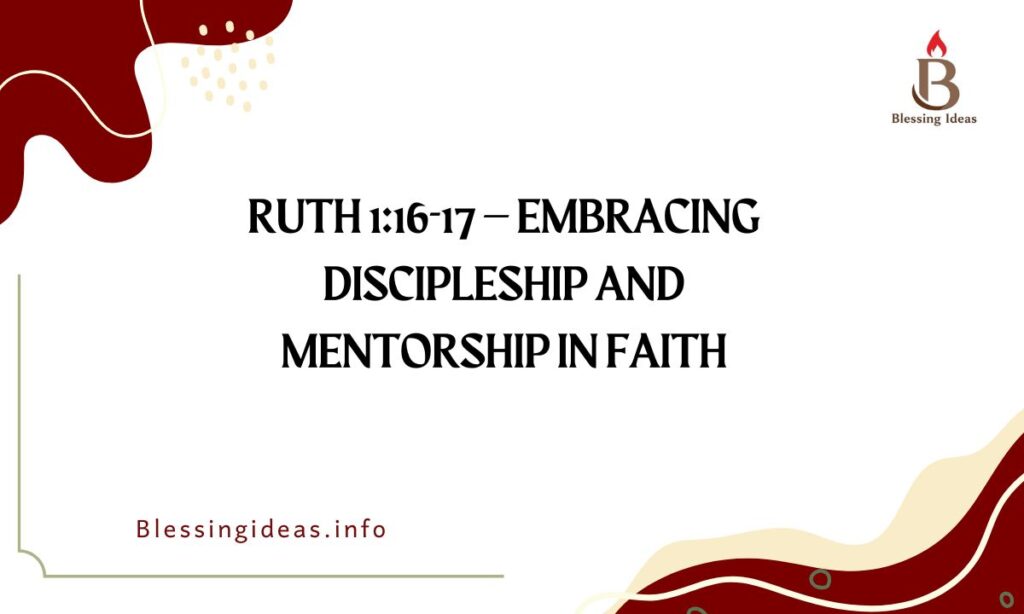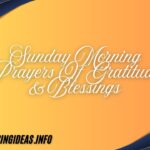Ruth 1:16-17 is one of the most powerful declarations of loyalty and devotion found in the Bible. When Ruth chose to follow Naomi, she was not only committing to her mother-in-law but also to Naomi’s God and people. Her words, “Where you go, I will go… your people will be my people and your God my God,” reveal a heart willing to embrace discipleship and walk in faith, even when the path ahead is uncertain.
In these verses, Ruth models what it means to embrace mentorship in faith. She humbled herself to learn, grow, and be guided by Naomi, reflecting the importance of having spiritual relationships that shape our walk with God. Her commitment demonstrates that discipleship is not only about belief but also about action—choosing to follow, serve, and remain faithful.
What does Ruth 1:16-17 mean?
The book of Ruth contains one of Scripture’s most beautiful declarations of loyalty and commitment. In Ruth 1:16-17, we encounter words that have echoed through centuries, inspiring countless believers in their journey of faith:
“But Ruth said, ‘Do not urge me to leave you or to return from following you. For where you go I will go, and where you lodge I will lodge. Your people shall be my people, and your God my God. Where you die I will die, and there will I be buried. May the Lord do so to me and more also if anything but death parts me from you.'”
Ruth 1:16-17 (ESV)
These verses reveal the heart of true discipleship and mentorship. Ruth, a young Moabite widow, faces a crossroads after losing her husband. Her mother-in-law Naomi urges her to return to her family and gods, but Ruth makes a radical choice. She commits not just to accompany Naomi, but to embrace an entirely new identity.
Ruth’s declaration encompasses four profound commitments. First, she pledges geographical loyalty: “where you go I will go.” Second, she commits to sharing Naomi’s daily life: “where you lodge I will lodge.” Third, she adopts Naomi’s community: “your people shall be my people.” Finally, and most significantly, she embraces Naomi’s God: “your God my God.”
This passage demonstrates authentic discipleship. Ruth doesn’t merely agree to help Naomi temporarily; she commits to permanent transformation. Her words echo the call of discipleship found throughout Scripture, where following God requires leaving the familiar and embracing the unknown.
The relationship between Ruth and Naomi also illustrates biblical mentorship. Despite Naomi’s bitterness and discouragement, Ruth recognizes something valuable in her mother-in-law’s faith tradition. She willingly places herself under Naomi’s guidance, choosing to learn from someone who has walked with God longer than she has.
Ruth’s commitment was costly. She left her homeland, family, religious traditions, and potential for remarriage among her own people. Yet her sacrifice led to incredible blessing. She became part of the lineage of King David and ultimately Jesus Christ, as recorded in Matthew 1:5.
This passage challenges modern believers to examine their own commitment to discipleship. Like Ruth, we must be willing to leave behind what is comfortable and familiar to follow God’s calling. We must also be ready to both seek mentors who can guide us and serve as mentors to others who are beginning their faith journey.
Reflection Questions

Reflection Questions for Christians
Understanding Discipleship and Mentorship:
- What does it mean to be a disciple in today’s world? How does Ruth’s example inform your understanding?
- What characteristics should you look for in a spiritual mentor? What qualities should you develop as a mentor to others?
Personal Faith Journey:
- Who has been your “Naomi” – the person who first introduced you to faith or guided you in your early Christian walk?
- What specific lessons did your spiritual mentors teach you that still impact your life today?
- How has God used difficult seasons in your life to deepen your faith, similar to how Naomi’s struggles became part of Ruth’s story?
Sacrifice and Commitment:
- What did you have to leave behind when you committed to following Christ? Family expectations, career goals, relationships, or lifestyle choices?
- Do you ever miss aspects of your pre-Christian life? How do you handle those feelings?
- What has God given you to replace what you sacrificed? How has He filled those empty spaces?
Mentoring Others:
- Who in your life could benefit from your spiritual guidance and encouragement?
- What non-Christian friends or family members need to hear about Jesus through your example and words?
- Which newer Christians in your church or community could use a mentor? What’s holding you back from reaching out to them?
Commitment Level:
- Is your commitment to Christ as absolute as Ruth’s was to Naomi? What areas of your life still need surrendering?
- How do you demonstrate daily that “your God is my God” in practical ways?
Reflection Questions for non-Christians
Understanding Faith:
- What does the concept of discipleship mean to you? What attracts or concerns you about the idea of following someone completely?
- When you observe Christians, what mentoring relationships do you see? What makes these relationships appealing or unappealing?
Observing Christians:
- Which Christians in your life do you most respect and want to emulate? What specific qualities set them apart?
- What have you noticed about how Christianity has changed people you know? Are these changes positive or negative in your view?
- Have you encountered Christians who, like Naomi, are going through difficult times but still maintain their faith? What do you think about their response to hardship?
Personal Barriers:
- What holds you back from considering Christianity seriously? Fear, intellectual doubts, lifestyle changes, or family pressure?
- What would you have to leave behind if you decided to follow Jesus? Are these sacrifices you’re willing to consider?
- What questions about Christianity do you need answered before you could make a commitment?
Next Steps:
- What step could you take today to learn more about Christian faith? Reading Scripture, attending church, or talking with a Christian friend?
- Are you willing to ask God, even tentatively, to reveal Himself to you if He exists?
- Who is a trustworthy Christian you could approach with honest questions about faith?
Reflection Questions for Kids
Family Relationships:
- What does it mean to be a good son or daughter? How do you show love to your parents every day?
- Ruth loved her mother-in-law so much she was willing to move to a new country. How do you show love to your grandparents or other family members?
- When your parents or grandparents teach you something new, how do you respond? Are you a good student?
Ruth’s Example:
- Ruth said “where you go, I will go.” When has someone in your family taken you somewhere special? How did that make you feel?
- Ruth was willing to learn about God from Naomi. Who teaches you about God? How do you listen when they teach you?
- Ruth took care of Naomi when she was sad. How can you help family members when they’re having a hard day?
Following and Learning:
- Who do you like to follow and copy? Why do you choose those people?
- What’s the difference between a good leader and a bad leader? What kind of leader do you want to be?
- When someone teaches you something new about God, what do you do with that information?
Making Good Choices:
- Ruth had to choose between staying with her family or going with Naomi. When do you have to make hard choices?
- How do you decide what’s right when you have to choose between two different things?
- Ruth chose to worship God instead of the gods her family worshipped. How do you choose to follow God instead of following what everyone else is doing?
Reflective Prayer

Use Ruth 1:16-17 as inspiration for prayer using the ACTS method: Adoration, Confession, Thankfulness, Supplication.
Adoration (Praising God)
Reflect on God’s character revealed in this passage:
- Praise God for His faithfulness that draws people like Ruth to abandon everything to follow Him
- Worship Him for being a God worth leaving everything behind to serve
- Adore His providence in weaving Ruth’s story into His greater plan of redemption
- Celebrate His ability to use mentoring relationships to build His kingdom
Prayer Example: “God, You are so faithful that even a foreign woman like Ruth could see Your worth and beauty. You are worthy of complete devotion and total commitment. Thank You for being a God who draws people from every nation to Yourself.”
Confession (Admitting Sin)
Let this passage reveal areas needing repentance:
- Confess half-hearted commitment to following Christ
- Admit times you’ve been reluctant to mentor others or receive mentoring
- Acknowledge when you’ve been unwilling to sacrifice comfort for spiritual growth
- Repent of preferring familiar sin over unfamiliar obedience
Prayer Example: “Lord, I confess that my commitment to You is often conditional and convenient. Unlike Ruth, I hold back parts of my life from You. Forgive me for my lukewarm discipleship and help me surrender completely.”
Thankfulness (Expressing Gratitude)
Express gratitude inspired by Ruth’s example:
- Thank God for spiritual mentors He has placed in your life
- Express gratitude for His patience as you’ve grown in faith
- Appreciate how He’s used difficult circumstances to deepen your relationship with Him
- Thank Him for the privilege of being part of His people, like Ruth joined Israel
Prayer Example: “Thank You for every person who has mentored me in faith. Thank You for accepting me into Your family even though I was once far from You. I’m grateful for Your persistent love that pursued me when I was lost.”
Supplication (Making Requests)
Pray for specific needs highlighted by this passage:
- Ask for courage to make Ruth-like commitments in your spiritual life
- Request wisdom to be a good mentor to others
- Pray for non-Christian friends to encounter faithful mentors
- Petition for strength to leave behind anything that hinders your discipleship
Prayer Example: “Lord, give me Ruth’s heart of total commitment. Help me mentor others with Naomi’s patient guidance. Bring mentors into the lives of my unsaved friends. Show me what I still need to leave behind to follow you completely.”
Conclusion
Ruth 1:16-17 stands as one of Scripture’s most powerful testimonies to the transformative nature of authentic discipleship and mentorship. Ruth’s unwavering commitment to Naomi and to the God of Israel demonstrates what it means to truly follow, regardless of cost or convenience.
This passage calls every believer to examine the depth of their commitment to Christ. Like Ruth, we are challenged to make declarations that go beyond temporary enthusiasm to permanent transformation. True discipleship involves not just believing certain truths, but allowing those






